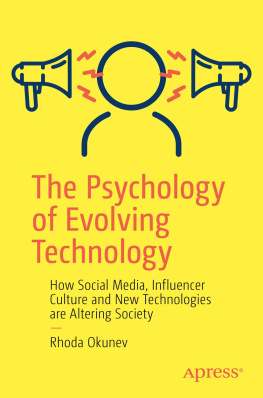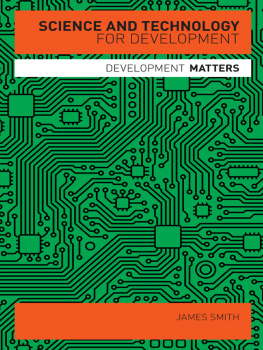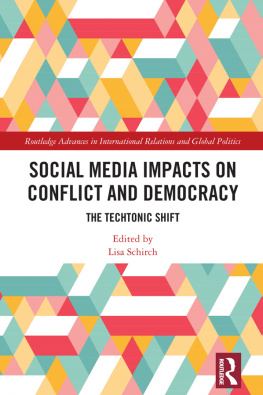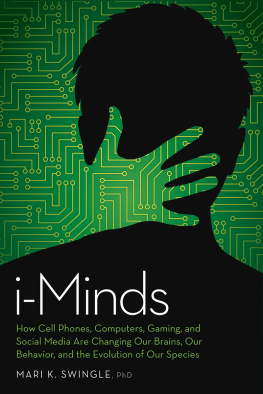
MEDIA TECHNOLOGY AND SOCIETY
Media Technology and Society offers a comprehensive account of the history of communications technologies, from the telegraph to the Internet.
Winston argues that the development of new media, from the telephone to computers, satellite, camcorders and CD-ROM, is the product of a constant play-off between social necessity and suppression: the unwritten law by which new technologies are introduced into society.
Winstons fascinating account challenges the concept of a revolution in communications technology by highlighting the long histories of such developments. The fax was introduced in 1847. The idea of television was patented in 1884. Digitalisation was demonstrated in 1938. Even the concept of the web dates back to 1945. Winston examines why some prototypes are abandoned, and why many inventions are created simultaneously by innovators unaware of each others existence, and shows how new industries develop around these inventions, providing media products for a mass audience.
Challenging the popular myth of a present-day Information Revolution, Media Technology and Society is essential reading for anyone interested in the social impact of technological change.
Brian Winston is Head of the School of Communication, Design and Media at the University of Westminster. He has been Dean of the College of Communications at the Pennsylvania State University, Chair of Cinema Studies at New York University and Founding Research Director of the Glasgow University Media Group. His books include Claiming the Real (1995). As a television professional, he has worked on World in Action and has an Emmy for documentary script-writing.
MEDIA TECHNOLOGY AND SOCIETY
A HISTORY: FROM THE TELEGRAPH TO THE INTERNET
Brian Winston
First published 1998
by Routledge
11 New Fetter Lane, London EC4P 4EE
Simultaneously published in the USA and Canada
by Routledge
29 West 35th Street, New York, NY 10001
Routledge is an imprint of the Taylor & Francis Group
This edition published in the Taylor & Francis e-Library, 2003.
1998 Brian Winston
All rights reserved. No part of this book may be reprinted or reproduced or utilised in any form or by any electronic, mechanical, or other means, now known or hereafter invented, including photocopying and recording, or in any information storage or retrieval system, without permission in writing from the publishers.
British Library Cataloguing in Publication Data
A catalogue record for this book is available from the British Library
Library of Congress Cataloging in Publication Data
Winston, Brian.
Media technology & society: a history/Brian Winston.
p. cm.
Rev. ed. of: Misunderstanding media. 1986.
Includes bibliographical references (p.) and index.
1. Mass mediaTechnological innovationsHistory.
2. CommunicationTechnological innovationsHistory.
3. CommunicationSocial aspects. 4. Mass mediaSocial aspects.
I. Winston, Brian. Misunderstanding media. II. Title.
P96. T42W49 1998
302.23dc21 9734781
ISBN 0-203-02437-0 Master e-book ISBN
ISBN 0-203-16063-0 (Adobe eReader Format)
ISBN 0-415-14229-6 (hbk)
ISBN 0-415-14230-X (pbk)
For my wife and childrenmy angels of history
CONTENTS
FIGURES
ACKNOWLEDGEMENTS
This book is a reworking and updating of material originally published in 1986 (Misunderstanding Media). I then essayed a polemic against the rhetoric of the Information Revolution grounded in a history, necessarily both synthetic and revisionist, of the central technologies of that supposed event. This current work is the other way round in that it again offers that history, mainly of electronic communications from telegraphy to holography, but now does so centrally with the anti-technicist polemic in the supporting role.
From the 1970s on I was increasingly aware of a gap between the rhetoric of runaway technological change and the reality of my professional life as a media worker and teacher. Working with film and teaching film-making when videotape was supposed to have wiped out that technology spurred a central thought that change was occurring more slowly than was (and is) commonly believed.
In synthesising the histories of these technologies I have obviously relied extensively on the work of others but my understanding owes more than can be adequately footnoted to colleagues and friends at New York University a decade and more agoespecially William Boddy, Michelle Hilmes, Aaron Nmugwen, Mitchell Moss and Martin Elton. Svein Bergum and Jimmy Weaver, members of my seminar group on technology and ideology at that time, were especially supportive as were others both at NYU and elsewhere including Daniel Zwanziger, Bernard Abramson, Robert Horwitz, Herb Schiller, Janet Staeger, Michael Wreen, Steve Scheuer and Nick Hart-Williams. The Interactive Telecommunications Programme at NYU was a crucial forum, especially for testing the validity of early versions of the model proposed in the Introduction and applied throughout this book.
My two commuter friends on the AMTRACK Hudson Valley line, Wayne Barden and Frederick Houston, helped me refine the legal points I wanted to make. (I am still grateful to Mo Fink and the other AMTRACK conductors for making that period of commuting when I was doing much of my early reading for the book so pleasant. I am also happy that much of the rewriting was done on Isambard Kingdom Brunels still great railroad between Paddington and Cardiff.) More recent thanks too to Xavier Delcourt and Angelo Agostini for guiding me to some fresh thoughts.
Bertell Olhman, Patrick Watson and Ted Conant kindly read bits and pieces of the original manuscript. Bill Boddy (in 1985) and Dwayne Winseck (in 1997) tackled the whole text and I am very much in their debt. Lynne Jackson was my research assistant at NYU and without her help this project would have been stillborn.
I am also grateful to Martin Barker and Geoff Mulgan (among others) for suggesting Misunderstanding Media might be usefully revisited; and I am pleased that Rebecca Barden thought so too. To Peter Hopkins goes my thanks for commissioning the original work and to Lindsay Waters for buying it as well. To my wife Adle goes my usual gratitude for undertaking correcting chores.
Cardiff
June 1997
INTRODUCTION: A STORM FROM PARADISE
TECHNOLOGICAL INNOVATION, DIFFUSION AND SUPPRESSION
THE INFORMATION REVOLUTION AS HYPERBOLE
A Klee painting named Angelus Novus shows an angel looking as though he is about to move away from something he is fixedly contemplating. His eyes are staring, his mouth is open, his wings are spread. This is how one pictures the angel of history. His face is turned towards the past. Where we perceive a chain of events, he sees one single catastrophe which keeps piling wreckage upon wreckage and hurls it in front of his feet. The angel would like to stay, awaken the dead, and make whole what has been smashed. But a storm is blowing from Paradise; it has got caught in his wings with such violence that the angel can no longer close them. This storm irresistibly propels him into the future to which his back is turned, while the pile of debris before him grows skyward. This storm is what we call progress.








